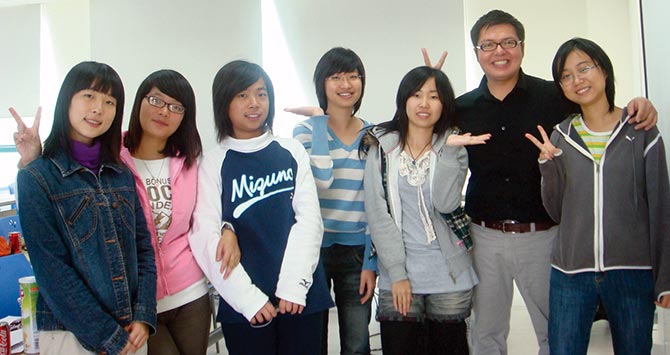Diné teacher feels right at home in China

(Courtesy photo)
Joel Tohtsonie, second from right, poses with members of his poetry club last semester in Zhuhai, China.
By Cindy Yurth
Tséyi' Bureau
CHINLE, Oct. 8, 2009
And then there's Joel Tohtsonie, right at home on the other side of the world.
The young Rock Point, Ariz., native, who is not actually Totsohnii but Kinlichiinii born for Tabaaha, was bitten by the travel bug while doing a semester abroad in Switzerland during his college career at the University of Arizona.
"It was a turning point in my life," he wrote in an e-mail to the Navajo Times.
So when Tohtsonie graduated with an English degree in 2006, he decided it was his ticket to the world.
Tohtsonie's first job was at an English school in Zhuhai, China, but once he got some experience under his belt, he was hired to teach English and Navajo culture at United International College. (It probably didn't hurt that the director of studies for the English program, who hired him, had visited Monument Valley and was wearing a turquoise bolo tie when she interviewed Tohtsonie.)
Tohtsonie said he's proud to be a faculty member at UIC, a "prestigious institution that accepts only about half of interested applicants."
But living in such a different culture can be a challenge.
"The hardest adjustment I had was coping with the inability to communicate with the local people," Tohtsonie writes. "I had never taken a Chinese culture/language class before, so I was absolutely overwhelmed! The language is difficult to learn, let alone being able to read it!"
To complicate matters, he's often mistaken for Chinese.
"'Is one of your parents Chinese?' 'Are you sure your grandparents were not Chinese?' - these are questions I hear on a weekly basis," Tohtsonie writes. "Now if I can only master Mandarin, I will definitely be Chinese."
He's pleased to report he's making good progress language-wise and is able to make himself understood in most normal situations.
Other things that took some getting used to were the heat and humidity of tropical Zhuhai, and the fact that manners are, um, a little different in China.
"People do not find spitting, blowing noses, urinating, and talking loudly on their phones in public as rude behavior," Tohtsonie writes. "In fact, it is very common to see these acts on city streets and public buses."
And don't even get him started on Chinese drivers.
"This morning, on my way to work for instance," Tohtsonie writes, "my driver and I were waiting at a red light in the right-hand lane. When the light changed, the man on our left decides he wants to go right so he pulls forward a little and then proceeds across our lane as we are driving forward.
"Now in America, you would consider that someone was drunk or crazy," he said, "but in China it is just assumed that he wanted to go right from the left-hand lane, so he did."
On the plus side, the Chinese are eager students, the food is terrific, and their patriotism is unmatched even by Americans - "either in true spirit or fear of the government," Tohtsonie notes wryly.
There's also a certain worldview Tohtsonie finds intriguing.
"A Chinese child is the most sensitive and tender child," he writes. "At the same time, they are tough and don't break. It is just not an option. Every problem is an opportunity for someone and if you are taught to think like this, it really has an interesting effect on what you are able to do. "
In his Navajo culture class - "my favorite part of the day" - Tohtsonie discovered that the Chinese don't know much more about Native Americans than what they've seen in the movies.
"Many were surprised when they discovered that the director of 'Windtalkers,' John Wu, is from Hong Kong," Tohtsonie writes.
And they don't know about the theory that they and Tohtsonie are long-lost relatives, thanks to the Bering land bridge. But it makes sense to them when he explains it, he said.
The instructor himself has come to believe the theory, the more he learns about Chinese culture.
"I believe we have roots in northern China," Tohtsonie writes. "The Yao people of Northern China live simplistic lives like our Navajo ancestors. Their cuisine incorporates a lot of lamb and they traditionally wear ornamental turquoise. Simple beliefs and stories relate to those of the Navajo."
Hearing his father's stories from his time as a missionary in Mongolia further convinced the young Diné. He noted that Mongolian yurts - semi-permanent tents - are circular like hogans, and the entrance always faces east.
Tohtsonie isn't sure how long he'll stay in Zhuhai. His original plan was to stay for a year and then go somewhere else, but he didn't count on "falling in love" with the place, the people and their culture (the weather he's still working on).
And the salary is enough for him to rent a quite nice two-bedroom apartment on the coast.
After three years, he's over the initial faux pas, like using the Chinese word for sanitary napkin in restaurants when he meant to ask for a regular napkin (he blames that on an error in the Lonely Planet Chinese phrase book).
"I am making the best out of the years I have on this earth," Tohtsonie writes. "If it means flying over vast oceans and meeting new and unique cultures, studying new languages, eating unfamiliar fruits and vegetables, learning new customs and practices - then may it be so.
"Through it all, I am Navajo ... that's something I will never forget."

